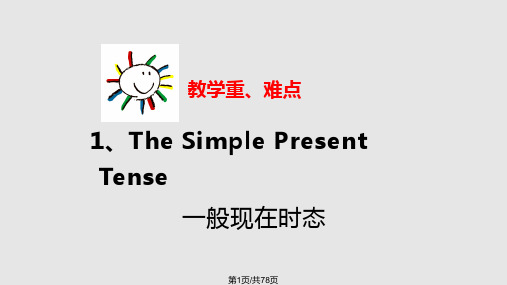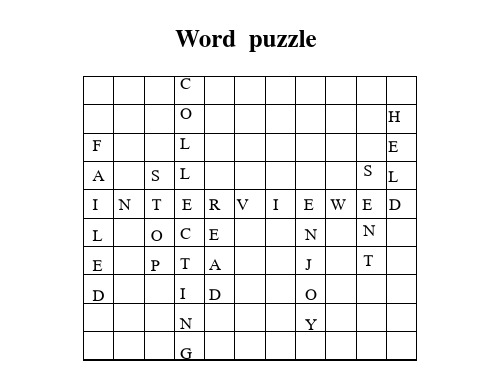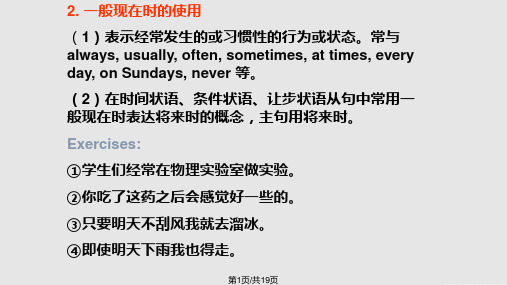初中英语时态PPT
合集下载
初中英语8大时态ppt课件

.
e.g.Has she any experience in teaching piano lessons?(√) Does she have any experience in teaching piano lessons? (√) 她有教钢琴的经验吗?
Had you a good time going hiking yesterday?(×) Did you have a good time going hiking yesterday?(√)
you/ they working?
.
Is he/ she/ it not working?或Isn’t
he/ she/ it
working?
现在分词的变法有:
1)、一般在动词词尾加上-ing , E.g. jump---jumping
2)、以不发音字母e结尾的动词,先去e,再加ing. E.g have---having
表示过去经常发生的动作,也 可用“used to do ”和“would +动词原形”。
.
肯定式
疑问式
否定式疑问否定式I源自wasateacher.
Was I a I was not
teacher? teacher.
a
Was I not a teacher?
He/ She was a
teacher.
It was Mary.
We/ You/ They
were teachers.
Were we/ We/ You/ They Were we/ you/ they not
you/ they were not/
teachers?或Weren’t we/
teachers?weren’t teachers.you/ they teacher?
e.g.Has she any experience in teaching piano lessons?(√) Does she have any experience in teaching piano lessons? (√) 她有教钢琴的经验吗?
Had you a good time going hiking yesterday?(×) Did you have a good time going hiking yesterday?(√)
you/ they working?
.
Is he/ she/ it not working?或Isn’t
he/ she/ it
working?
现在分词的变法有:
1)、一般在动词词尾加上-ing , E.g. jump---jumping
2)、以不发音字母e结尾的动词,先去e,再加ing. E.g have---having
表示过去经常发生的动作,也 可用“used to do ”和“would +动词原形”。
.
肯定式
疑问式
否定式疑问否定式I源自wasateacher.
Was I a I was not
teacher? teacher.
a
Was I not a teacher?
He/ She was a
teacher.
It was Mary.
We/ You/ They
were teachers.
Were we/ We/ You/ They Were we/ you/ they not
you/ they were not/
teachers?或Weren’t we/
teachers?weren’t teachers.you/ they teacher?
初中英语六种时态复习课件(35张PPT)

②while 引导的从句表示“在……期间”,主从句谓语动词所表示的动 作同时ቤተ መጻሕፍቲ ባይዱ生。这时,主从句都用过去进行时。
e.g.:My father was reading the newspaper while my mother was watching TV.当我的妈妈看电视的时候,我的爸爸正在看报纸。
(2)表示普遍真理或客观事实。 e.g.:The sun rises in the east.太阳从东方升起。 (3)在条件状语从句和时间状语从句中,用一般现在时表示将来。 e.g.:If it doesn't rain tomorrow,we will go for a picnic.如果明天不下 雨,我们将去野餐。 (4)在某些以 here,there 开头的句子中用一般现在时表示正在发生的动作。 e.g.:There goes the bell.铃响了。
(3)现在进行时表示将来 表示位置移动的动词 go,come,leave,fly,start,meet,move 等, 可以用现在进行时表示将要发生的事。 e.g.:We are leaving for London.我们就要动身去伦敦了。
(4)一般现在时表示将来 ①表示按规定或时间表预计要发生的动作。 e.g.:Our plane takes off at 8:10.我们的飞机 8:10 起飞。 ②当主句为一般将来时,或含有情态动词,或是祈使句时,在 if,as soon as,until,when 等引导的状语从句中用一般现在时表示将来。 e.g.:I will give him the book as soon as he comes here.他一来这儿, 我就把这本书给他。
(2)表示当前一段时间内的活动或现阶段正在进行的动作。 e.g.:They are picking apples on a farm all the time.他们一直在农场 摘苹果。 (3)与 always,usually 等词连用,表达说话人强烈的感情,如赞扬、不 满、讨厌等。 e.g.:Mary is always thinking of others instead of herself.玛丽总是为 别人着想,而不为自己着想。
初中英语七种时态 初中英语语法 教学PPT课件

1.改为一般疑问句并回答。 Are you doing your homework now? Yes, I am./No, I'm not. 2.改为否定句。
I am not doing my homework now.
五、过去进行时 1.过去进行时:表示在过去某一时刻或某一阶
段正在进行的动作。
2.常用时间状语: at that time, at 8:00 last
4)表示客观真理,客观存在,自然现象。 例如:The earth moves around the sun.
地球绕太阳转动。
I do my homework every day.
1.改为一般疑问句并回答。 Do you do your homework every day? Yes, I do./No, I don't. 2.改为否定句。
2.过去进行时的用法:
表示在过去某时刻正在进行或发生的动作,通常与表 示过去的时间壮语连用。
例如:At this moment yesterday, I was packing for camp. 昨天这个时候间壮语从句的复合句中,表示一个过去的 动作发生时或发生之后,另一个动作正在进行。
close
sit begin run put
lie die tie
-ing形式
listening spending staying
having preparing
closing
sitting beginning running
putting
lying dying tying
I am doing my homework now.
like live
plan stop drop
I am not doing my homework now.
五、过去进行时 1.过去进行时:表示在过去某一时刻或某一阶
段正在进行的动作。
2.常用时间状语: at that time, at 8:00 last
4)表示客观真理,客观存在,自然现象。 例如:The earth moves around the sun.
地球绕太阳转动。
I do my homework every day.
1.改为一般疑问句并回答。 Do you do your homework every day? Yes, I do./No, I don't. 2.改为否定句。
2.过去进行时的用法:
表示在过去某时刻正在进行或发生的动作,通常与表 示过去的时间壮语连用。
例如:At this moment yesterday, I was packing for camp. 昨天这个时候间壮语从句的复合句中,表示一个过去的 动作发生时或发生之后,另一个动作正在进行。
close
sit begin run put
lie die tie
-ing形式
listening spending staying
having preparing
closing
sitting beginning running
putting
lying dying tying
I am doing my homework now.
like live
plan stop drop
英语八大时态PPT课件(详细版)

b
15
He is a lazy man . He ____the dirty jeans every day.(2014 )
A. always wears B. always wearing C. always to wear D. is always wearing
You will know the truth after you ___him.(2013) A. see B. will see C. are seeing D.to see
b
16
三、一般过去时
1、构成 一般过去时用动词的过
去式表示。除系动词be的过去式 有人称和数的变化外,其他动词 的过去式无人称和数的变化。
b
17
2、用法
※表示过去已经发生的动作,现在 已经结束,常与相应的过去时间状 语连用。 Tom fell ill last night , and he had to stay at home.
【翻译】
我今年20岁,住在北京。 I am twenty years old this year , and I live in Beijing.
火车将在一个小时后(in an hour)出发(set off)。 The train sets off in an hour.
她每天都走路上学。 She walks to school every day. 或:She goes to school on foot every day.
If it doesn’t rain tomorrow,we’ll
go shopping.
பைடு நூலகம்
b
6
常与一般现在时连用的时间状语有:
often 经常
英语八大时态PPT课件(详细版)

come)
The perfect tense is formed by combining the presentation
particles of the verb with have or has (e.g., he has gone, she has come)
The Composition of the Eight Tenses in English
03
Examples
I have studied, They have played, He has written
Present simple tense
Definition
The present simple tense is used to express an action that is verbal, generic, or not emphasizing time
VS
Tense can be classified into two categories: simple tense and complex tense Simple tense includes present, past, and future tense, while complex tense includes the perfect, the superior, the future perfect, and the conditional perfect tense
Conditional Perfect Tense
It is used to express actions or events that would have been completed in the past if a condition had been met
The perfect tense is formed by combining the presentation
particles of the verb with have or has (e.g., he has gone, she has come)
The Composition of the Eight Tenses in English
03
Examples
I have studied, They have played, He has written
Present simple tense
Definition
The present simple tense is used to express an action that is verbal, generic, or not emphasizing time
VS
Tense can be classified into two categories: simple tense and complex tense Simple tense includes present, past, and future tense, while complex tense includes the perfect, the superior, the future perfect, and the conditional perfect tense
Conditional Perfect Tense
It is used to express actions or events that would have been completed in the past if a condition had been met
初中英语八大时态PPT课件

第11页/共78页
把下列句子改为否定句
1.My father has an egg for breakfast . My father doesn’t have an egg for breakfast .
2.Li Lei does his homework after school. Li Lei doesn’t do his homework after school.
教学重、难点
1、The Simple Present Tense
一般现在时态
第1页/共78页
一般现在时
• 表示经常发生的动作或存在的状态
• 常与every day , on Sundays, usually ,always,等连用
sometimes , often ,
• 结构 : 1、主语+动词原形+其他
• Eg.
• I have a meeting on Sundays .
• They visit their parents once a month.
第2页/共78页
注: 主语(三单)+ 动词(第三人称单数形式)+
其他
Eg. 1) She likes it very much.
2) She usually goes to school at 7 o’clock every morning.
第18页/共78页
动词过去式的写法:
一般情况,
I work in this city.
在动词末尾
I worked in this city last year. 加ed
They live in Shanghai . They lived in Shanghai last year.
把下列句子改为否定句
1.My father has an egg for breakfast . My father doesn’t have an egg for breakfast .
2.Li Lei does his homework after school. Li Lei doesn’t do his homework after school.
教学重、难点
1、The Simple Present Tense
一般现在时态
第1页/共78页
一般现在时
• 表示经常发生的动作或存在的状态
• 常与every day , on Sundays, usually ,always,等连用
sometimes , often ,
• 结构 : 1、主语+动词原形+其他
• Eg.
• I have a meeting on Sundays .
• They visit their parents once a month.
第2页/共78页
注: 主语(三单)+ 动词(第三人称单数形式)+
其他
Eg. 1) She likes it very much.
2) She usually goes to school at 7 o’clock every morning.
第18页/共78页
动词过去式的写法:
一般情况,
I work in this city.
在动词末尾
I worked in this city last year. 加ed
They live in Shanghai . They lived in Shanghai last year.
初中英语八种时态归纳PPT

10. About 400 years ago, Galileo proved that the earth travels (travel) around the sun.
Part B 语态
Active Voice
Passive Voice
主动语态
1. Many people speak English.
At the party.
--- I _l_ik_e___ your jacket, Tim. How long _h_a_v_e_y_o_u__h_a_d__ it?
Oh…er… I __b_o_u_g_h_t__it last week. W__o_u_l_d_y_o_u__li_k_e_ to dance, Becky? ---Phew. It’s __h_o_t__ here. --- Put your jacket on the chair. You ____n_e_e_d_n’wt orry. It’ll be ok. ---That’s _b_e_tt_e_r __.
8. Mr. Green and his wife had lived (live) in London for a few years before they came (come) to work in China in 2001.
9. He said he w__o_u_ld__n_o_t_s_p_e_a(k not,speak) at the meeting the next day.
4. Hurry! Your classmates _a_r_e_w__a_it_i_n_g(wait) for you in the classroom..
1. This is the third time you _h_a_v_e__b_e_e_n__(be) here.
Part B 语态
Active Voice
Passive Voice
主动语态
1. Many people speak English.
At the party.
--- I _l_ik_e___ your jacket, Tim. How long _h_a_v_e_y_o_u__h_a_d__ it?
Oh…er… I __b_o_u_g_h_t__it last week. W__o_u_l_d_y_o_u__li_k_e_ to dance, Becky? ---Phew. It’s __h_o_t__ here. --- Put your jacket on the chair. You ____n_e_e_d_n’wt orry. It’ll be ok. ---That’s _b_e_tt_e_r __.
8. Mr. Green and his wife had lived (live) in London for a few years before they came (come) to work in China in 2001.
9. He said he w__o_u_ld__n_o_t_s_p_e_a(k not,speak) at the meeting the next day.
4. Hurry! Your classmates _a_r_e_w__a_it_i_n_g(wait) for you in the classroom..
1. This is the third time you _h_a_v_e__b_e_e_n__(be) here.
初中英语语法—时态(28张) PPT课件 图文

(4)现在完成时与表示一段时间的for短语、since短语或从句等 时,应注意句中的谓语动词须是延续性的,而不能是非延续性动词,如 come→be here,go→be there,die→be dead,borrow→keep,buy→h ,join→be in,leave→be away,begin to study→study等。
6.过去进行时
(1)概念:表示过去某一时刻或某一时间段内正在进行的动作。 (2)构成形式:was/were+动词的-ing形式 ①表示往返、位移的动词的过去进行时常可用来表示过去将来时
时态 We wanted to tell her that the train was_leaving an hour later.
1.一般现在时
基本用法: (1)表示经常性、习惯性的动作; He always helps others. 他总是帮助别人。
时态 (2)表示现在的情况或状态;
He is a teacher. 他是个老师。 (3)表示客观事实和普遍真理。 The sun rises in the east. 太阳从东边升起。 构成形式:am/is/are或实义动词的原形(主语是第三人称单数时,动 词要用第三人称单数形式)。
时态 (2)构成形式:have/has+动词的过去分词。
(3)与现在完成时连用的时间状语有for a long time,recently,yet, lately,ever,never,already,since,by this time,before,just,in t past/last few years,since+过去的时间点,since+时间段+ago,since +从句(一般过去时)。
表示感觉的动词。如:see,hear等。 表示喜欢或厌恶的动词。如:like,love等。 表示希望的动词。如:want,would like等。
初中英语语法——四大基本时态课件(共24张ppt)

____(ring, ra√ng, rung).
现在进行时使用环境、句型变化
★作谓语的动词用来表示动作(情况)发生时间的 各种形式称为时态。
★概念:表示现阶段或说话时正在进行的动作及行 为。
★时间状语:Now, at this time, days, look. listen等时 间状语做标志。
★基本结构:主语+be +doing +其他 ★否定形式:主语+be +not +doing+其他 ★一般疑问句:把be动词放于句首。
事,正要做某事。 ⑤某些动词,可用进行时态表将来,如come,
现在进行时的用法
1)、现在(说话的瞬间)正在进行或发生的动作,强调“此时此刻” E.g. He is reading . They are talking now.
2)、当前一段时间内的活动或现阶段正在进行的动作。 E.g. They are working these days.
3)、 某些动词的现在进行时,表预定的计划或即将发生的动作。 E.g I am coming.
一般现在时--句型变化
❖ ③含有be动词的要在be上做变化.
❖
Danny is a good student. 陈述句
❖
丹尼是个好学生。
❖
Danny isn't a good student. 否定句
❖
丹尼不是个好学生。
❖
Is Danny a good student? 一般疑问句
❖
丹尼是个好学生吗?
此句中给出的do指“做,干”, not指把此句变为否定句, 故须在do前加助动词don't。
做题时常见错误五、对主语的数判断有误
现在进行时使用环境、句型变化
★作谓语的动词用来表示动作(情况)发生时间的 各种形式称为时态。
★概念:表示现阶段或说话时正在进行的动作及行 为。
★时间状语:Now, at this time, days, look. listen等时 间状语做标志。
★基本结构:主语+be +doing +其他 ★否定形式:主语+be +not +doing+其他 ★一般疑问句:把be动词放于句首。
事,正要做某事。 ⑤某些动词,可用进行时态表将来,如come,
现在进行时的用法
1)、现在(说话的瞬间)正在进行或发生的动作,强调“此时此刻” E.g. He is reading . They are talking now.
2)、当前一段时间内的活动或现阶段正在进行的动作。 E.g. They are working these days.
3)、 某些动词的现在进行时,表预定的计划或即将发生的动作。 E.g I am coming.
一般现在时--句型变化
❖ ③含有be动词的要在be上做变化.
❖
Danny is a good student. 陈述句
❖
丹尼是个好学生。
❖
Danny isn't a good student. 否定句
❖
丹尼不是个好学生。
❖
Is Danny a good student? 一般疑问句
❖
丹尼是个好学生吗?
此句中给出的do指“做,干”, not指把此句变为否定句, 故须在do前加助动词don't。
做题时常见错误五、对主语的数判断有误
初中英语语法时态(共25张PPT)

A.goes B.will go
C.would go D.are going
2.--Did your son fail his English exam once again?
--Yes, but he told me he____hard next term.
A.studies B.is studying C.will studyD.would study
2 have been to+地点,表示“去过某
地”。(人已回) I have been to Europe. (I am not in Europe now.)
3 have been in+地点+时间段,表示“在/ 来某地多久”。
I have been in Europe for three weeks. (I am now still in Europe .)
3.现在完成时和一般过去时的异同点: 1 共同点:动作都在过去。 2 不同点:和现在有无关系。(与现
在有关的过去动作用现在完成,与现在 无关的过去动作用一般过去。)
4.易错点:
1 have gone to+地点,表示“去了某地”。
(人已走,尚未回。只用于第三人称。)
They have gone to Europe. (They are not here.)
C.didn’t he
D.did he
三、现在进行时
1.用法:
A.现刻动作:目前正在发生的动作。
B.现阶段动作:目前一个时期一直在进 行的动作,此刻不一定在进行。
2.标志词:now,Look! Listen!
中考模拟:
--Mike, who____football in the yard?
英语八大时态PPT课件(详细版)

14
The man ____ with his parents once a year.
(2014 )
A.goes travel
B. goes traveling
C. is going travel D.is going traveling
She is doing her homework while her mother ____ to her.(2014 ) A. speaks B. spoke C.to speak D. speaking
I will not let you go until you have finished your work.
31
※和time连用的情况 This/It is the first time that I have seen a panda.
※由since引导的从句中,主句用 现在完成时,从句用一般过去时。 We have been friends since we met at school.
23
※be to do:表示已经计划或安排 好的动作。 The president is to visit China next week.
The meeting is to start early tomorrow.
24
※be about to do:表示马上要发 生的事,不强调主观。
The train is about to leave.
我今年20岁,住在北京。 I am twenty years old this year , and I live in Beijing.
火车将在一个小时后(in an hour)出发(set off)。 The train sets off in an hour.
The man ____ with his parents once a year.
(2014 )
A.goes travel
B. goes traveling
C. is going travel D.is going traveling
She is doing her homework while her mother ____ to her.(2014 ) A. speaks B. spoke C.to speak D. speaking
I will not let you go until you have finished your work.
31
※和time连用的情况 This/It is the first time that I have seen a panda.
※由since引导的从句中,主句用 现在完成时,从句用一般过去时。 We have been friends since we met at school.
23
※be to do:表示已经计划或安排 好的动作。 The president is to visit China next week.
The meeting is to start early tomorrow.
24
※be about to do:表示马上要发 生的事,不强调主观。
The train is about to leave.
我今年20岁,住在北京。 I am twenty years old this year , and I live in Beijing.
火车将在一个小时后(in an hour)出发(set off)。 The train sets off in an hour.
初中英语八大时态讲解_图文

2 have been to+地点,表示“去过某地”
。(人已回) I have been to Europe. (I am not in Europe now.)
3 have been in+地点+时间段,表示“在/ 来某地多久”。
I have been in Europe for three weeks. (I am now still in Europe .)
go there get home open close get to know borrow buy
be there be home be open be closed know keep have
1.The film began 5 The film_h_a_s b_e_en_o_n__ for 5
• 9.They got to know 10 They_h_av_e_k_n_o_w_n__since 10
years ago.
years ago.
• 10.I borrowed the book a I_h_a_v_e _k_e_p_t _the book for a
week ago.
week.
二、一般过去时
1.用法:过去的动作或状态。
2.标志词:
yesterday, the day before yesterday,
three days ago, last night/week/month…,in the past;just
now=a moment ago
例题
Li Ming didn’t understand what American people
4.He joined the club 3 He__h_as_b_e_en_i_n__the club for
初中英语语法大全——时态(共27张PPT)

二、一般过去时
(1)表示在过去确定的时间里发生的动作或存在的状态。 eg: Lucy was a student last year, but now she is a teacher. 露西去年是一名学生,但是现在她是一名老师。 eg: Where were you last Saturday? --- I was in the Capital Museum. 上周六你在哪里? 我在首都博物馆。 eg: She didn't go out last night, because she had a headache. 她昨天晚上没有出去,因为地头痛。
(2) 过去将来时也可用was/were going to do, was/were to do, was/were about to do等形式表示。 eg: Lucy promised she was going to come the next d ay. 露西答应她第二天要来。 eg: We didn't know whether they were going to give us a talk this afternoon. 我们不知道他们今天下午是否给我们做报告。
六.过去进行时
(1) 表示在过去某一时刻正在进行的动作。 eg: I was watching the football match at 10:00 last night. 昨晚10点我在看足球赛。 eg: --- We couldn’t find you anywhere around 8:00 yesterday evening.
初中英语语法大全 时态
时态是句子的谓话通过自身的变化来表示动作成情况发生时的 各种形式,英语动词时态共有16种但中学阶段要求掌握的有8 种。动词的时态构成形式如下:
英语中常用的十种时态PPT课件

第2页/共19页
Ⅱ.一般过去时
1. 谓语构成: be (was were), have (had),其他人称用 过去式。
2. 一般过去时的使用:
(1).表示在过去某一时间发生的动作或存在的状态。常 与yesterday, last Sunday morning, last year, two hours ago, just now, the other day, once upon a time等表示过去的时间状语连用。
2. 一般现在时的使用 (1)表示经常发生的或习惯性的行为或状态。常与 always, usually, often, sometimes, at times, every day, on Sundays, never 等。 (2)在时间状语、条件状语、让步状语从句中常用一 般现在时表达将来时的概念,主句用将来时。
Exercises: ①学生们经常在物理实验室做实验。 ②你吃了这药之后会感觉好一些的。 ③只要明天不刮风我就去溜冰。 ④即使明天下雨我也得走。
第1页/共19页
1. The students often do experiments in the physics laboratory. 2. After you take this medicine, you will feel better. 3. As long as it is not windy tomorrow, I will go skating. 4. Even if it rains tomorrow, I will leave .
第18页/共19页
感谢您的观看!
第19页/共19页
第8页/共19页
Ⅳ. 过去将来时
1. 谓语构成: would 或should+动词原形 2. 过去将来时的使用:
Ⅱ.一般过去时
1. 谓语构成: be (was were), have (had),其他人称用 过去式。
2. 一般过去时的使用:
(1).表示在过去某一时间发生的动作或存在的状态。常 与yesterday, last Sunday morning, last year, two hours ago, just now, the other day, once upon a time等表示过去的时间状语连用。
2. 一般现在时的使用 (1)表示经常发生的或习惯性的行为或状态。常与 always, usually, often, sometimes, at times, every day, on Sundays, never 等。 (2)在时间状语、条件状语、让步状语从句中常用一 般现在时表达将来时的概念,主句用将来时。
Exercises: ①学生们经常在物理实验室做实验。 ②你吃了这药之后会感觉好一些的。 ③只要明天不刮风我就去溜冰。 ④即使明天下雨我也得走。
第1页/共19页
1. The students often do experiments in the physics laboratory. 2. After you take this medicine, you will feel better. 3. As long as it is not windy tomorrow, I will go skating. 4. Even if it rains tomorrow, I will leave .
第18页/共19页
感谢您的观看!
第19页/共19页
第8页/共19页
Ⅳ. 过去将来时
1. 谓语构成: would 或should+动词原形 2. 过去将来时的使用:
初中英语八大时态总结ppt课件

was/ were +ing。
have/ has + ed。
had + ed。
10
一般现在时 一般现在时,在没有be动词和助动词have,has,
或情态动词的情况下,要变为否定句或疑问句 的时候要借用助动词do或者does。
肯: I work here.
否: I don’t work here.
问:Do you work here?
问:Were you working here?
答:Yes, I was./ No, I wasn’t.
最新版整理ppt
16
现在完成时
肯: I have worked here.
否:I have not worked here. 问:Have you worked here?
答:Yes, I have./ No, I haven’t.
2
一般过去时
含义:过去发生的动 作或事情。例如:我 过去在这工作、我见 过她、我吃了一个苹 果。
最新版整理ppt
3
一般将来时
含义:将来要发生的动 作或状态。 例如:我
将在这工作、我将与她 见面、我将吃掉一个苹 果。
最新版整理ppt
4
一般过去将来时
含义:站在过去谈论将 要发生的事情。 例如:
一个月以前我说过,我 将要来长沙工作。 两个
现在进行时
肯: I am working here.
否:I am not working here.
问:Are you working here?
答:Yes, I am./ No, I am not.
最新版整理ppt
15
过去进行时
肯: I was working here. 否:I was not working here.
have/ has + ed。
had + ed。
10
一般现在时 一般现在时,在没有be动词和助动词have,has,
或情态动词的情况下,要变为否定句或疑问句 的时候要借用助动词do或者does。
肯: I work here.
否: I don’t work here.
问:Do you work here?
问:Were you working here?
答:Yes, I was./ No, I wasn’t.
最新版整理ppt
16
现在完成时
肯: I have worked here.
否:I have not worked here. 问:Have you worked here?
答:Yes, I have./ No, I haven’t.
2
一般过去时
含义:过去发生的动 作或事情。例如:我 过去在这工作、我见 过她、我吃了一个苹 果。
最新版整理ppt
3
一般将来时
含义:将来要发生的动 作或状态。 例如:我
将在这工作、我将与她 见面、我将吃掉一个苹 果。
最新版整理ppt
4
一般过去将来时
含义:站在过去谈论将 要发生的事情。 例如:
一个月以前我说过,我 将要来长沙工作。 两个
现在进行时
肯: I am working here.
否:I am not working here.
问:Are you working here?
答:Yes, I am./ No, I am not.
最新版整理ppt
15
过去进行时
肯: I was working here. 否:I was not working here.
- 1、下载文档前请自行甄别文档内容的完整性,平台不提供额外的编辑、内容补充、找答案等附加服务。
- 2、"仅部分预览"的文档,不可在线预览部分如存在完整性等问题,可反馈申请退款(可完整预览的文档不适用该条件!)。
- 3、如文档侵犯您的权益,请联系客服反馈,我们会尽快为您处理(人工客服工作时间:9:00-18:30)。
• The boy ____always ____ us! (夸赞)
A.is;helping
B.does;help
C.can;help
D./;help
•You ____ always _____ the same mistake!
(责备)
A.do;make
B.does;make
C.is;making
from now on
-
14
4.shall/will/be going to之间的区别: shall往往用于第一人称疑问句, will可用于任何人称。
will常用于表邀请或命令时以及 带有意愿色彩。
计划决定要做某事,一般用be going to do 结构。
-
15
I would- work. 5
完 成
现在完成时, have/has加过分。 过去完成时,
时 had 加过分。
I have worked.
I had worked.
-
6
பைடு நூலகம்
各种时态的用法
一、一般现在时 1.用法:A.现在经常性的动作或状态
B.客观事实和真理。 2.标志词:always,usually,often, sometimes, never,every day /week /month/year/…
days ago, last night/week/month…,in the past;just now=a moment ago
点击中考
Li Ming didn’t understand what American people said,_____? (2004北京市中考)
A.couldn’t he C.didn’t he
1.The boy usuallyg_e_t_s(get) to school early.
2.Light t_r_a_v_e_ls_(trave-l)faster than soun7d.
二、一般过去时
1.用法:过去的动作或状态。
2.标志词:
yesterday,the day before yesterday, three
A.has played
B.will play
C.was playing
- D.is playing
9
1.Look!What___the children___ over there? A.are;do B.are;doing C.is;do D.is doing 2.Those workers____here these months.
初中英语语法(1)
动词的时态
-
1
二、时态的种类:初中常见的8种时态
现在范畴
过去范畴
一般现在时态
一般过去时态
现在进行时态
过去进行时态
现在完成时态
过去完成时态
一般将来时态
过去将来时态
-
2
动词的时态结构歌谣
一 一般现在时,动词用原型; 般 单数三人称,动词加“s” 。
一般过去时,动词加“ed”。
I work.
C.is sleeping,got up D.sleeps,get up
2.She___apples in her garden when I____to see her yesterday.
A.picked,went
B.was picking, went
C.picked,was going
D.was picking,was going
He works. I worked.
-
3
进
现在进行时, am,is,are,-ing。
行 过去进行时,
时 was,were,-ing。
例句:I am working.
例句:I was working.
-
4
一般将来时, 将 will加原型。 来 过去将来时,
would加原型。
I will work.
D.are;making
-
12
四、过去进行时
1.用法:过去某时正在进行的动作。
2.标志词:at that time,this time yesterday,then,when…
1.Father______when I _____yesterday morning.
A.still slept,got up B.was still sleeping,got up
-
13
五、一般将来时
1.用法:将来的动作或状态。
2.结构:will
shal(l 第一人称) +V.(原型)
be going to
3.标志词:tomorrow,the day after
tomorrow,in three days,in (the)
future,next week/month/term…,
B.could he
-
8
D.did he
三、现在进行时
1.用法:
A.现刻动作:目前正在发生的动作。
B.现阶段动作:目前一个时期一直在进 行的动作,此刻不一定在进行。
2.标志词:now,Look! Listen!
中考模拟:
--Mike, who____football in the yard?
--Let me go and see. (2004顺义)
--No, you needn’t. Jack_____them.
A.is watering C.waters
B.watering
- D.is watered
10
注意
A.有几个瞬间动词可以用现在进行时表将 来,如:begin,start,come,go,leave。
1.--Lucy! Would you like to give me a hand?
--OK. I____.
A.will come
e
C.am coming
D.would come
2.--When____you____for Toronto?
--Tomorrow.
A.do;leave
B.are;leaving
C.will;leaving
- D.shall;leave
11
B.现在进行时和always连用,表示说话 人较强烈的感情色彩。
A.are work
B.are worked
C.work
D.are working
3.--How__you___along with your workmates? --Very well.
A.do;get B.will;get C.can;get D.are;getting
4.--Must I water the flowers now?
